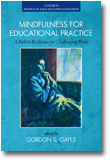
Mindfulness for Educational Practice
A Path to Resilience for Challenging Work
Edited by:
Gordon S. Gates, Washington State University
A volume in the series: Research on Stress and Coping in Education. Editor(s): Christopher J. McCarthy, University of Texas at Austin. Richard G. Lambert, University of North Carolina at Charlotte.
Published 2015
This book is the 8th Volume in the Research on Stress and Coping in Education Series. Mindfulness is gaining attention within many disciplines including education and the authors present original research and current theory for examining ways such practice can be used to improve school outcomes for students and strengthen supports for teachers and school leaders. The chapters are written to be useful for practitioners and pre-service educators by posing recommendations for those considering these strategies and techniques. Specific treatment is given to work of teachers, principals, and superintendents.
Research is beginning to document the acceptability and efficacy of mindfulness-based interventions (MBIs) in the reduction of stress and burnout, and in the improvement of occupational health and well-being, among educators and school administrators. In this groundbreaking volume of the Research on Stress and Coping in Education series - Mindfulness for Educational Practice: A Path to Resilience for Challenging Work, educational researchers and practitioners advance the exploration of MBIs in educational settings by asking how they might contribute not only to stress reduction and resilience enhancement, but also to the improvement of relationships and the everyday practices of leadership, teaching and learning in the schools.
Individual chapters in this volume focus on key questions in the field of study concerned with mindfulness in education today, including (1) What is the role of MBIs in enhancing emotional self-awareness and self-care in teachers, as well as their sense of efficacy and agency with regard to making broader educational changes? (2) Can mindfulness training; by enhancing attentiveness to counterfactual or novel information, as well as environmental conditions and other people’s perspectives more generally, benefit educational leaders in their work in guiding their staffs towards collaborative educational reforms? (3) Can the cultivation of emotional awareness and emotion regulation skills (e.g., non-reactivity) through mindfulness training help educators – from pre-service teachers to superintendents, to improve their interpersonal skills with students, families and community members? (4) In classroom settings, can the cultivation of mindfulness and compassion in teachers promote closer teacher-student relationships and greater student engagement in learning academic subjects like math? These are the timely and important pragmatic questions addressed theoretically, empirically, and practically in this volume.
The collective chapters in this volume, drawn largely from the experience of practitioners working in the schools everyday, are characterized by qualitative and action research methods and phenomenological reports of educators as they embark on a process of professional development through mindfulness training. As such, the volume marks a significant contribution in terms of documenting the perspectives, challenges, and triumphs educators are currently experiencing as they engage with MBIs in education both within and beyond the mindfulness-training context. The book is an excellent read and an important one for all those interested in research on mindfulness in education today.
Robert W. Roeser
Co-Editor with Dr. Kimberly Schonert-Reichl of “Handbook of Mindfulness in Education: Theory, Research & Practice” (2015, Springer)
Professor of Psychology
Portland State University
Portland, Oregon
September 14, 2014
CONTENTS
About the Artist and Cover Art: “In Contemplation.” Introduction. 1 I Don’t Really Have Time to Think, Do I Feel Happy or Sad? The Role of Self-Awareness as a Change Mechanism in Stress Management Interventions, Claire W. Lyons. 2 Teacher Stress and Misbehavior Toward Students: A Problem of Work Motivation, Zeynep Kiziltepe. 3 Moving Forward by Sitting Still: An Autoethnographic Study of Mindfulness, JoAnne Fabian. 4 Mindfulness in Educational Leadership: Coping With Stress and Improving Professional Practice in the Superintendency, Teena McDonald and Gordon S. Gates. 5 In Pursuit of Reliability: A District-Level Action Research Concerned With Resilience, Michelle R. Price. 6 Inquiry on Supporting Urban High School Principals: Action Research for Mindfulness Practice, Nancy E. Coogan and Gordon S. Gates. 7 Moving Toward Mindfulness Instructional Expressions of Caring in Mathematical Education, Janet Hart Frost and Barbara J. Gilbert. About the Contributors.
-
Paperback9781623968151
Web price: $45.04 (Reg. 52.99)
-
Hardcover9781623968168
Web price: $80.74 (Reg. 94.99)
- eBook9781623968175

- EDU000000 - EDUCATION: General
- SEL024000 - SELF HELP: Stress Management
- EDU008000 - EDUCATION: Decision-Making & Problem Solving
-
 Emerging Thought and Research on Student, Teacher, and Administrator Stress and Coping
Emerging Thought and Research on Student, Teacher, and Administrator Stress and Coping
-
 Higher Education for the People
Critical Contemplative Methods of Liberatory Practice
Higher Education for the People
Critical Contemplative Methods of Liberatory Practice
-
 International Perspectives on Teacher Stress
International Perspectives on Teacher Stress
-
 Personality, Stress, and Coping
Implications for Education
Personality, Stress, and Coping
Implications for Education
-
 Research on Teacher Stress
Implications for the COVID-19 Pandemic and Beyond
Research on Teacher Stress
Implications for the COVID-19 Pandemic and Beyond
-
 Stress and Coping of English Learners
Stress and Coping of English Learners
-
 Toward a Broader Understanding of Stress and Coping
Mixed Methods Approaches
Toward a Broader Understanding of Stress and Coping
Mixed Methods Approaches

